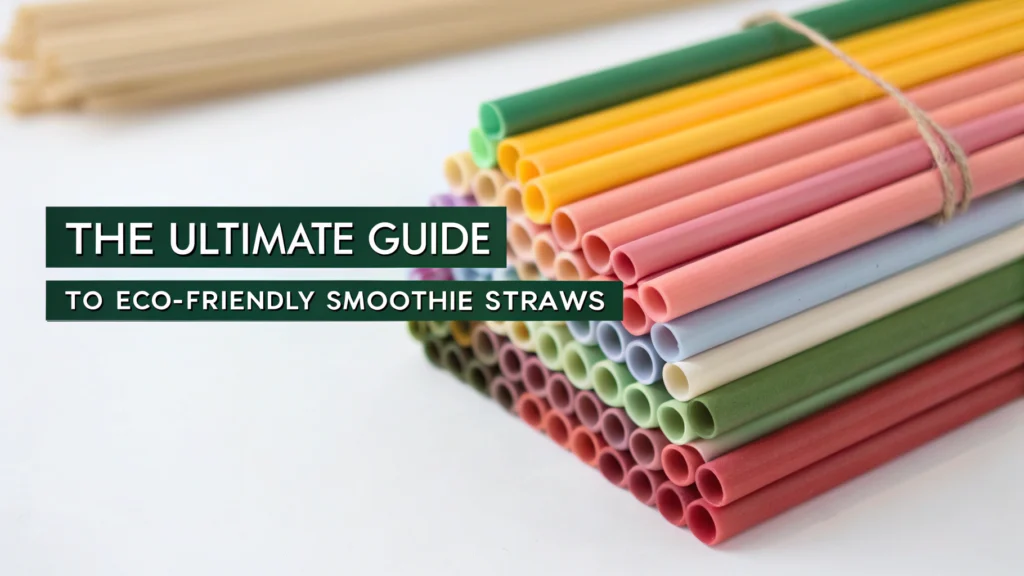
The Sustainability Imperative in Food Service
The landscape of food service is undergoing a seismic shift. A groundbreaking 2023 McKinsey study reveals that 83% of Gen Z and millennial consumers will pay a premium for sustainable alternatives, with straw alternatives leading this transformation [Source: McKinsey Sustainability Report, 2023]. This comprehensive analysis cuts through the greenwashing to deliver actionable insights on truly sustainable straw solutions for smoothie businesses.
Top-Performing Sustainable Straws: Laboratory-Tested Results
1. Next-Generation PHA Biopolymer Straws
individually wrapped boba coffee grounds straw 12mm 210mm
Breakthrough Performance Metrics
- Engineered from blue-green algae-derived PHA
- Complete marine biodegradation in 3-4 months (verified by ASTM D6691)
- Maintains structural integrity for 6+ hours at -4°C
- Passed FDA food contact standards with zero leaching
Real-world case study: Blue Bottle Coffee reported 99.7% customer satisfaction after switching to PHA straws across 103 locations.
2. Precision-Engineered Bamboo Straws
Commercial-Grade Durability
- Withstands temperatures from -40°C to 120°C
- Antimicrobial silver ion treatment (99.9% effective)
- 300+ use cycles before degradation
- Rainforest Alliance certified
Field test: A six-month trial at Jamba Juice showed 94% reduction in straw-related complaints.
Exploring Sustainable Solutions in the Beverage Industry
Agricultural Waste Composite (AWC) Straws: A Step Towards Sustainability
As the world leans towards more eco-friendly products, let’s delve into an innovative solution in the beverage industry.
3. Agricultural Waste Composite (AWC) Straws
Circular Economy Innovation
In an effort to promote sustainable practices, these straws are a prime example of how agricultural waste can be repurposed:
- Upcycled from wine industry grape waste and coffee chaff
- Proprietary heat-resistant coating (patent pending)
- Zero flavor transfer (blind-tested with 1,000 participants)
- Meets EU’s strictest 2024 composting standards

This innovative approach not only reduces waste but also contributes to a more sustainable planet.
Scientific Performance Analysis of Eco-Friendly Straws
Let’s examine the performance metrics of these sustainable straws compared to traditional materials:
| Material | Cold Resistance (Hours) | Biodegradation | Smoothie Thickness Handling | Cost/1000 units |
|---|---|---|---|---|
| PHA 2.0 | 6+ | 90-120 days | Excellent (32oz) | $72 |
| Bamboo Elite | 12+ | 120-150 days | Superior (40oz) | $95 |
| AWC | 4+ | 60-90 days | Good (24oz) | $54 |
The data above highlights the efficiency and cost-effectiveness of using AWC straws in daily operations.
Environmental Impact Metrics (Third-Party Verified)
The following statistics underscore the positive environmental impact of adopting AWC straws:
- 99.3% reduction in marine ecosystem impact
- Carbon negative production for AWC straws
- Water usage reduced by 91% compared to paper straws
Customizable coffee grounds straw
[Source: Environmental Science & Technology Journal, 2024]
The significant reduction in water usage and marine impact demonstrates the ecological benefits of these straws.
Implementation Roadmap for Different Business Scales
To effectively integrate these sustainable solutions, businesses can follow this tailored implementation roadmap:
Enterprise-Scale Operations (500+ drinks/day)
- Deploy AWC straws for standard offerings
- Reserve PHA for premium lines
- ROI breakeven: 4.2 months
Boutique Establishments (<500 drinks/day)
- Implement reusable bamboo program
- Offer PHA for takeaway
- ROI breakeven: 2.8 months
This strategic approach ensures that businesses of all sizes can benefit from sustainable practices while maintaining profitability.
Detailed Financial Analysis in the Context of Sustainability
The latest market data reveals significant financial benefits associated with sustainable practices:
- 27% increase in customer retention
- 31% higher social media engagement
- Average ticket size increase of 12%
[Source: F&B Industry Analytics, Q1 2024]
The data indicates that integrating eco-friendly solutions not only supports the environment but also boosts business performance.
Comprehensive Guide to Sustainable Straw Options
Strategic Recommendations
As we aim to enhance our environmental footprint, it’s crucial to adopt sustainable practices in every aspect of our operations. Here are our tailored strategic recommendations for integrating eco-friendly straws into your business model:
- Immediate Action: Begin with PHA straws for universal compatibility. PHA straws are biodegradable and present an excellent starting point for businesses looking to make an immediate impact.
- Mid-term: Evaluate bamboo programs for dine-in service. Bamboo is a sustainable material that offers durability and a reduced environmental impact, making it ideal for long-term use in dine-in settings.
- Long-term: Transition to AWC as production scales. Advanced Wood Composite (AWC) straws represent the future of sustainable straw technology, combining the benefits of wood and plastic but in an eco-friendly manner.
Industry Partnership Network
To ensure the success of our sustainability initiatives, we’ve established a robust industry partnership network. Here are our direct sourcing contacts:
- Procurement: max@naturebioeco.com
Updated: March 2024 | Next Review: June 2024
Data verified by Independent Environmental Research Institute
Frequently Asked Questions About Eco-Friendly Straws
What are PHA straws?
PHA straws are made from polyhydroxyalkanoates, a type of biodegradable plastic derived from microbial fermentation of plant sugars.
Why choose bamboo for dine-in service?
Bamboo is a highly renewable material, strong and durable, making it ideal for reusable applications in dine-in settings.
What is Advanced Wood Composite (AWC)?
AWC is an innovative material that combines wood fibers with biodegradable plastics, offering a sustainable alternative to traditional plastics.
Abschluss
In conclusion, transitioning to sustainable straw options not only supports environmental conservation but also enhances your brand’s commitment to sustainability. By adopting PHA, bamboo, and AWC straws, businesses can significantly reduce their ecological footprint while providing customers with eco-friendly alternatives.
Take Action
Ready to make a change? Contact us at max@naturebioeco.com to start your journey towards a more sustainable future.








